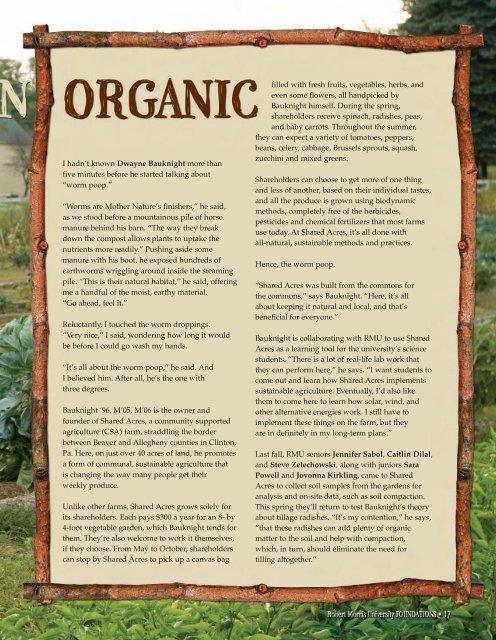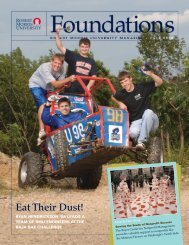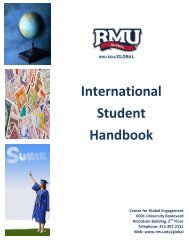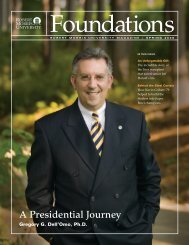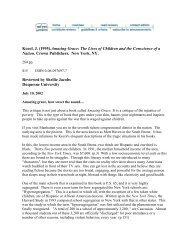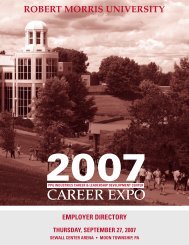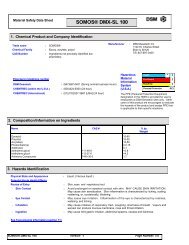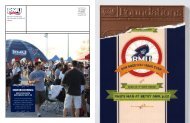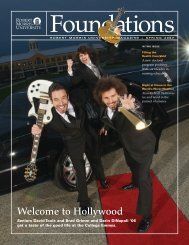Download - Robert Morris University
Download - Robert Morris University
Download - Robert Morris University
Create successful ePaper yourself
Turn your PDF publications into a flip-book with our unique Google optimized e-Paper software.
I hadn’t known Dwayne Bauknight more thanfive minutes before he started talking about“worm poop.”“Worms are Mother Nature’s finishers,” he said,as we stood before a mountainous pile of horsemanure behind his barn. “The way they breakdown the compost allows plants to uptake thenutrients more readily.” Pushing aside somemanure with his boot, he exposed hundreds ofearthworms wriggling around inside the steamingpile. “This is their natural habitat,” he said, offeringme a handful of the moist, earthy material.“Go ahead, feel it.”Reluctantly, I touched the worm droppings.“Very nice,” I said, wondering how long it wouldbe before I could go wash my hands.“It’s all about the worm poop,” he said. AndI believed him. After all, he’s the one withthree degrees.Bauknight ‘96, M’05, M’06 is the owner andfounder of Shared Acres, a community supportedagriculture (CSA) farm, straddling the borderbetween Beaver and Allegheny counties in Clinton,Pa. Here, on just over 40 acres of land, he promotesa form of communal, sustainable agriculture thatis changing the way many people get theirweekly produce.Unlike other farms, Shared Acres grows solely forits shareholders. Each pays $300 a year for an 8- by4-foot vegetable garden, which Bauknight tends forthem. They’re also welcome to work it themselves,if they choose. From May to October, shareholderscan stop by Shared Acres to pick up a canvas bagfilled with fresh fruits, vegetables, herbs, andeven some flowers, all handpicked byBauknight himself. During the spring,shareholders receive spinach, radishes, peas,and baby carrots. Throughout the summer,they can expect a variety of tomatoes, peppers,beans, celery, cabbage, Brussels sprouts, squash,zucchini and mixed greens.Shareholders can choose to get more of one thingand less of another, based on their individual tastes,and all the produce is grown using biodynamicmethods, completely free of the herbicides,pesticides and chemical fertilizers that most farmsuse today. At Shared Acres, it’s all done withall-natural, sustainable methods and practices.Hence, the worm poop.“Shared Acres was built from the commons forthe commons,” says Bauknight. “Here, it’s allabout keeping it natural and local, and that’sbeneficial for everyone.”Bauknight is collaborating with RMU to use SharedAcres as a learning tool for the university’s sciencestudents. “There is a lot of real-life lab work thatthey can perform here,” he says. “I want students tocome out and learn how Shared Acres implementssustainable agriculture. Eventually, I’d also likethem to come here to learn how solar, wind, andother alternative energies work. I still have toimplement these things on the farm, but theyare in definitely in my long-term plans.”Last fall, RMU seniors Jennifer Sabol, Caitlin Dilal,and Steve Zelechowski, along with juniors SaraPowell and Jovonna Kirkling, came to SharedAcres to collect soil samples from the gardens foranalysis and on-site data, such as soil compaction.This spring they’ll return to test Bauknight’s theoryabout tillage radishes. “It’s my contention,” he says,“that these radishes can add plenty of organicmatter to the soil and help with compaction,which, in turn, should eliminate the need fortilling altogether.”


